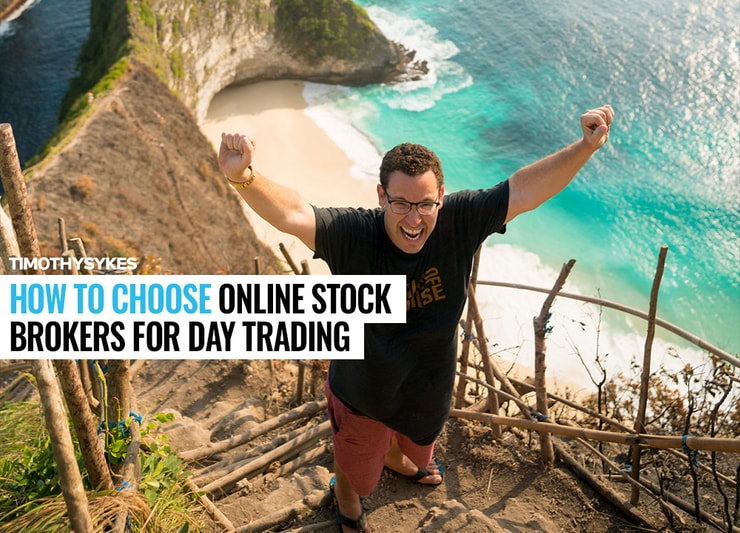What You Must Know Before Choosing a Broker: Key Takeaways
- How to choose the right one for YOU…
- THIS is the one tool you can’t trade without — get tips for finding your best fit…
- What to do BEFORE you make your first trade…
I like to keep my trading simple. I stick to the penny stocks I know and I don’t use a lot of fancy indicators, for example. But one thing every trader needs is a broker. You literally can’t trade without it. So before you jump into opening an account with the most popular trading app, read on to learn how to find YOUR best broker…
Table of Contents
What’s a Broker?

Your broker is the single most important tool day traders use. It’s how all your stock buy and sell orders get filled.
But not all brokers are the same. Some have crappy executions and high fees. Others have restrictions on the stocks and strategies you can trade.
So what’s the best broker?
You have to find what works best for you and what fits your trading style. Take your time and do some research. You don’t have to choose just one, either. And if you’re not happy with the one you have, it’s never too late to switch it up.
Remember, they work for you.
New to the sketchy world of penny stocks? Start your education with my FREE penny stock guide.
What Does a Stock Broker Do?
When you think about trading, you think about investors, buying and selling shares on an exchange, right? But who’s the facilitator? That’s your broker.
You see, when you want to dabble in the markets, maybe with a couple of ETFs or options trading, you need a brokerage account. You’re not going to just call up the NYSE and ask for 100 shares of Company X. That’s where your broker steps in.
A stock broker’s business is to serve as the middleman. They execute your trades, offer resources for analysis, and provide a range of services designed to help you navigate the rough seas of the stock market. The extent of these services depends on the type of broker. More on that next.
Learning how to trade involves both a broker and a trader (that’s you!). If you’re new to day trading or need a refresher on what a day trade entails, here’s a detailed explanation of the day trade definition.
Types of Stock Brokers
Now, let’s get into the two main kinds of brokers you’ll encounter: discount brokers and full-service brokers.
When choosing a broker, it’s important to be aware of the rules and regulations that apply. One of the key rules is the ‘Pattern Day Trader’ rule, which sets certain requirements for traders who execute four or more day trades within five business days. Understanding these rules can help you avoid potential pitfalls and trade more effectively.
To learn more about these regulations, read our guide on pattern day trader rules.
Discount Brokers
Enter the discount broker, the choice for most DIY investors. These are the no-frills, cost-effective option. You get a platform for trading stocks, options, ETFs, and sometimes more. Resources for analysis are usually barebones, but hey, that’s what other sites and platforms are for.
Don’t expect to find an advisor or a dedicated team waiting to guide you. You’re flying solo here, and the minimum balance required is usually low. But the best part? Low commissions or even commission-free trades.
One thing to remember though, customer support may not be their strong suit. But if you’re confident in your trading and don’t need much hand-holding, discount brokers can be a great fit.
More Breaking News
- Vizsla Silver Shows Resilience Amid Unsteady Market
- Dingdong Sells China Operations to Meituan Subsidiary, Retains Global Presence
- GTM Stock Experiences Notable Fluctuations Amid Recent Financial Developments
- Supreme Court Greenlights New Gold’s Game-Changing Acquisition by Coeur Mining
Full-Service Brokers
On the other end of the spectrum, we’ve got full-service brokers. These are your one-stop-shop for all things investing. You’ve got a whole suite of products at your disposal — stocks, options, mutual funds, ETFs, and sometimes even things like credit cards or loans.
Here you’ll find a higher level of customer support, with a team ready to assist you. These brokers often provide comprehensive analysis tools, detailed research, and even personal financial advisors. This is an option for those looking for more than just trade execution. Of course, this comes at a cost, and the minimum balance required will usually be higher.
What to Look For in a Broker

Here are some important points to consider when researching a broker…
Execution Time
As a trader, you want the best possible executions. So dig in to research how quickly a broker can execute your trade orders.
After all, you can’t trade if you can’t get a position.
And if you plan to trade OTC stocks, executions can be tricky. OTCs aren’t as liquid as listed stocks. That means it can take longer to get your orders filled.
If you plan to trade OTC stocks, consider trying different brokers out to test their executions.
How Much Are the Fees?
Most brokers offer commission-free trades. But that’s typically only for listed stocks.
If you plan to trade OTCs, you could still be subject to a flat fee on each buy and sell order. Or you might pay a fee based on your position size.
Each broker will also have different monthly fees for real-time data and Level 2 quotes.
But if you focus on good setups and avoid overtrading, fees are negligible over time. To me, fees are worth it if I’m getting good service and good executions.
Can You Access the Right Stocks?

I know it sounds crazy, but in this day and age, some brokers still don’t allow OTC trading or short selling.
Those are two strategies many of my top students use.
So if you plan to short or trade OTCs, make sure your broker allows it.
And if you use the trading platform offered by your broker, you have even more to consider…
What’s the Broker’s Trading Platform?
Your trading platform is where you look at charts, build watchlists, run scans, and place orders.
It’s the second most important tool for day traders, after your broker. You want to have the best tools at your disposal to make decisions quickly and with the best information.
Brokers usually offer a simple web-based platform for users. And for more active traders, they can offer a downloadable platform with more tools and indicators. Some brokers charge a fee for these ‘better’ platforms.
But you’re not tied to trading platforms only offered by your broker. If you like their executions but not their charts, try another trading platform.
Customer Service Matters
Technology is great — when it works. There are no guarantees. And there will be days things go wrong. When the markets go crazy, brokers can struggle to keep up.
Sometimes tech crashes and there’s nothing you can do about it.
But when you have questions about how things work or why something’s not right, you’ll want to know you can contact someone who can answer your questions quickly.
Your broker works for you. Remember that. And it’s where you plan to put a lot of your money. So make sure they offer solid, reliable customer service.
Top 5 Best Online Stock Brokers in 2023
Making sense of ratings and reviews for online brokers can be a real headache. There’s a multitude of options, but let’s narrow it down to the top dogs. For this, I’ve considered factors like features, costs, customer support, and overall value for investors. Here are the top five online stock brokers in 2023.
TD Ameritrade/Charles Schwab
Kickstarting our list is TD Ameritrade, which will become fully integrated into Charles Schwab by the end of 2023. Together, they’re the best at being a full-service broker with an array of services. This brokerage comes with an extensive library of educational resources and high-level analysis tools. The site is straightforward to navigate, and they offer top-notch customer support.
E-Trade
E-Trade isn’t just an old player; it’s an evolving one. Catering to a range of investors from novice to experienced, E-Trade offers a wide array of investment products. The platform is intuitive, and the resources are solid. E-Trade stands out for its advanced options trading features, making it a good choice for savvy options traders.
Fidelity Investments
Fidelity isn’t in the business of trailing behind. They’re a powerhouse offering extensive research, an easy-to-use platform, and a wide array of services. Fidelity’s strength lies in its robust set of tools and comprehensive research. Notably, their platform shines when it comes to retirement services.
Interactive Brokers
If you’re a global trader or into advanced strategies, Interactive Brokers might be your match. It’s got a steep learning curve and a minimum balance, but the range of features and market access is remarkable. It’s not for everyone, but for seasoned traders, this is a tool to master.
Robinhood
Robinhood broke the mold by offering commission-free trades. It’s a discount broker, no frills, no fuss, and it’s garnered a massive following of younger, tech-savvy investors. The interface is clean and easy to use, but remember, resources and tools for deeper analysis are limited.
What About Trading Apps?

Many brokers now offer trading apps. It makes it easy to trade right from your phone. But I don’t use them.
When I’m in a trade, I’m laser-focused on the chart. And I usually stay in positions for a few minutes. I want to be in and out of trades FAST. I don’t trust a phone app to do that for me.
If I’m away from my computer and miss a trade, that’s fine. You don’t have to catch every single trade. There will always be another opportunity.
You might get lucky for a while trading from your phone. But if you want to stay in the game long term, you need to use the right tools.
The Importance of Using the Right Tools
The most important part of choosing a broker is to make sure you choose the right one for YOU. That depends on your trading strategies, your account size, how often you trade, and whether you go long, short, or both.
A broker might have good executions but high fees. Prioritize what’s important to you.
And before you even make a trade — get a trading education.
Trading Challenge

All of my 20+ millionaire students came from my Trading Challenge. But they didn’t join my Challenge, open a trading app, and start making money.
They put in years of dedicated studying. You must learn what moves stocks, the patterns, and why they repeat. Trading isn’t easy. But having a mentor, the right tools, and education can greatly increase your learning curve. That’s what my Trading Challenge is all about.
Ready for the Challenge? Apply today!
How to Choose the Right Online Broker for You
Making a choice involves some homework. Here’s your study guide on how to choose the right online broker.
Know Your Needs
This isn’t a one-size-fits-all situation. If you’re a beginner, you’ll need educational resources to navigate the choppy waters of trading. If you’re a seasoned sailor, advanced analysis tools may be your go-to. Knowing your needs is the first step.
What Kind of Trades You Want to Execute
What’s your play? Stocks, ETFs, options, or a bit of everything? Different brokers specialize in different areas. Options trading might be the forte of one, while others might shine with ETFs. Align your trading preferences with the strengths of your brokerage.
Your Investing Goals
Are you aiming to grow a retirement fund, day trading for income, or just dabbling for now? Aligning your broker choice with your long-term goals is crucial. Full-service brokers might be more suitable for long-term investors, while discount brokers could be a perfect match for active traders.
Narrow Down Your Field

Once you’ve sorted out your needs, preferences, and goals, it’s time to narrow down your choices. Look at the top contenders, consider their pros and cons, check customer reviews, and pay attention to the overall ratings.
Figure out the Fees
Every broker’s got a cost structure. Some offer commission-free trades but might have high account fees or vice versa. Ensure you understand the costs involved — this includes trading fees, account fees, and any costs tied to using additional features or services.
Test the Platform of the Broker
This one’s vital. Get a feel for the platform. Most brokers offer a demo or trial period. Utilize it. The interface, tools, and usability all contribute to your trading experience.
Choosing the right trading platform is crucial for day traders. It’s where you’ll analyze charts, monitor market trends, and execute trades. Some platforms are specifically designed to cater to the needs of day traders, offering advanced features and tools to help you stay on top of the market.
If you’re looking for a platform that can enhance your day trading experience, check out this guide on the best trading platforms for day traders
Analyze Ease of Depositing and Withdrawing Funds
We’re talking about your money here. The process of depositing and withdrawing funds should be straightforward and swift. Delays and complexities could hamper your trading activities.
Look into Customer Service
Customer support is a crucial aspect. Even the most experienced traders can face technical issues or have queries. You want a broker with efficient and responsive customer support.
What Are the Fees Associated with a Broker?

In the trading world, nothing comes free. Each broker will have a unique fee structure, and it’s essential to understand these before you dive in.
Key Takeaways
A stock broker acts as your gateway to the markets, executing trades on your behalf. There are two primary types of brokers: discount and full-service. Your choice depends on your needs, the kind of trades you want to make, and your long-term goals.
While choosing a broker, focus on fees, platform usability, fund transfer convenience, and customer service. Don’t just fall for flashy features or aggressive marketing. Go for the one that aligns best with your trading style and objectives.
Trading isn’t rocket science. It’s a skill you build and work on like any other. Trading has changed my life, and I think this way of life should be open to more people…
I’ve built my Trading Challenge to pass on the things I had to learn for myself. It’s the kind of community that I wish I had when I was starting out.
We don’t accept everyone. If you’re up for the challenge — I want to hear from you.
Apply to the Trading Challenge here.
Trading is a battlefield. The more knowledge you have, the better prepared you’ll be.
Who’s your broker? Let me know in the comments — I love hearing from my readers!




Leave a reply